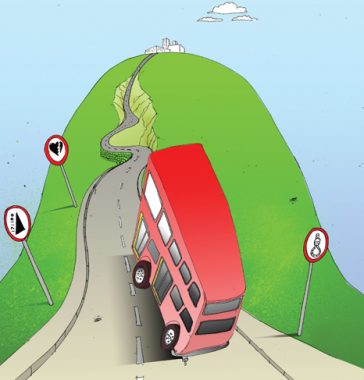The problem
We treat a rural population, with 10% of patients over 75 and a higher than average prevalence of chronic disease. In addition to this, many of our patients live a 30-minute drive from our practice so home visits can be time-consuming, both for the GPs and the district nursing team. As a result, we reviewed our home visits over a 12-month period and realised that 86% of the calls were generated because people did not have access to transport. As it is often difficult to provide gold-standard care at home for many conditions, because of a lack of access to equipment, and visits often perpetuate social isolation and reduce resilience, we decided to tackle this in a new way.
What we did
Together with the local CCG, hospital trust and Reeth and District Community Transport (a charitable transport initiative), we devised a project to provide free transport for housebound patients, to allow them to attend the practice for routine checks, such as monitoring of heart conditions, blood tests and flu vaccinations. We used the existing community bus (which was previously only used for day trips) as it was already wheelchair friendly and goes to all the little roads that our patients live on, not just the main roads that public transport accommodates.
Instead of referring a patient for a district nurse visit, we are now able to arrange free transport for that person to come to a dedicated clinic at the practice. We also have a district nurse who comes to the practice to see the patients and so we can solve several of the patients’ problems in one visit to the practice, saving time on repeat appointments. Patients also have the benefit of being able to combine this with calling in at the post office or lunch clubs, reducing social isolation.
Challenges
The main cost to us was in terms of time, organising and co-ordinating the transport. But now the service is up and running, this task has become easier as patients and staff work together. The practice purchased a wheelchair for the transport bus to use, but otherwise there was fairly minimal outlay as we were using existing infrastructure.
Result
In the first year from October 2015, there was a 42% reduction in home visits, which we think was largely due to this transport service. Some 93% of people using the service were extremely satisfied, and we have been able to provide better care than the patient would have received at home, for example with ECG, Doppler, point-of-care testing and ear syringing.
The transport service has reduced the number of hours the GP and nursing team (district and practice nurses) spend on home visits – around one to two hours a week of clinician time per 1,000 patients, which would have been spent travelling instead of on clinical care.
By triaging district nursing referrals at the practice, fewer appointments are required, as care can be grouped together – for example blood tests, dressing checks and long-term condition checks can all be done at the same time. This saves us time in the practice by reducing the number of referrals we need to make.
The time saved by the district nurses has been used to launch a new project to provide outpatient intravenous antibiotic therapy at the practice. This saves patients up to 300 miles of travelling a week to the hospital. Bringing the care closer to home reduces travelling and inconvenience for our patients and also increases the skills of our nurses, so everyone benefits.
The practice has also done joint training with the practice nurses and the district nurses and we share our workload, which helps everyone. Working on a project with the community nursing team has improved communication and team spirit in general.
In addition, providing the opportunity for people to come to the practice has reduced social isolation and improved self-confidence for a number of elderly residents. The buses can also now be used as a home delivery service for medicines for older or vulnerable patients.
It was also a huge morale boost to be nominated for GP team of the year at the General Practice Awards for this project.
Marie Brookes is a managing partner at a practice in Reeth, North Yorkshire
Pulse October survey
Take our July 2025 survey to potentially win £1.000 worth of tokens















